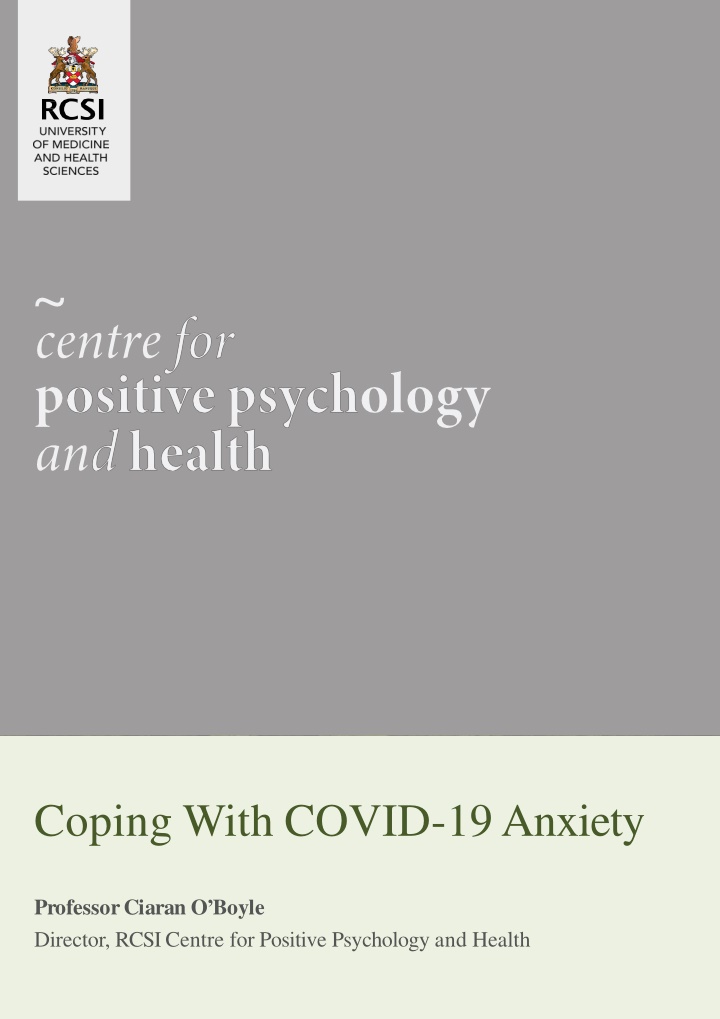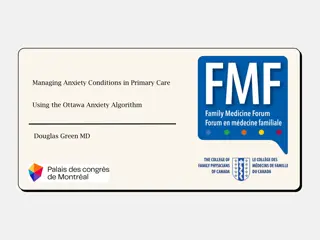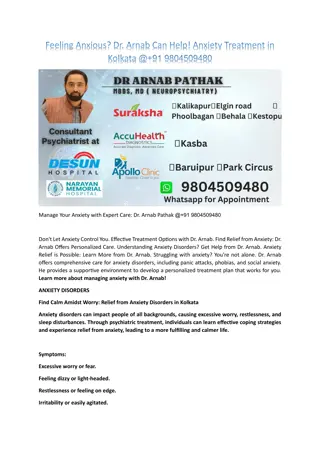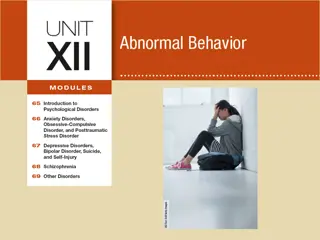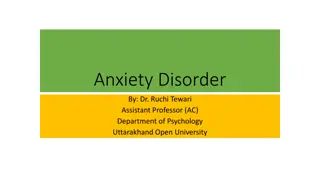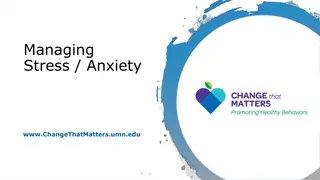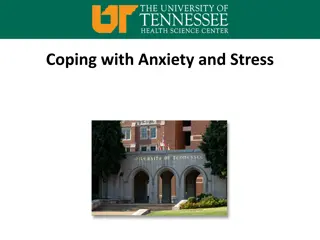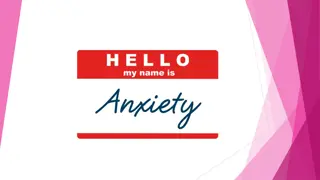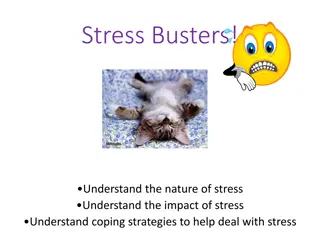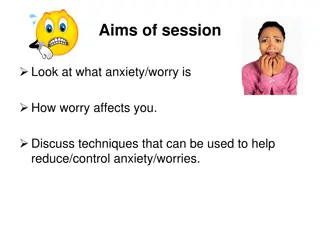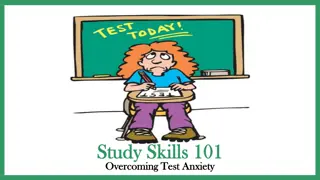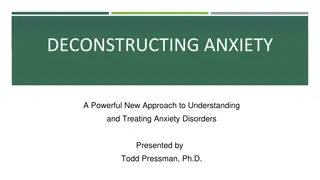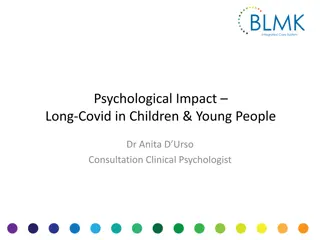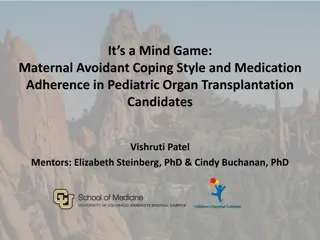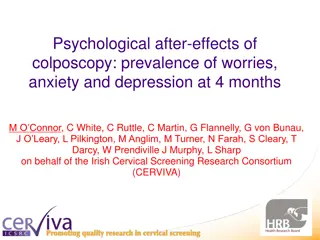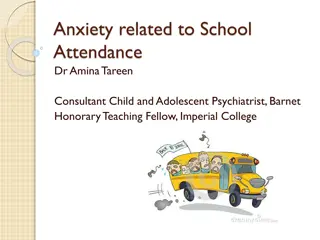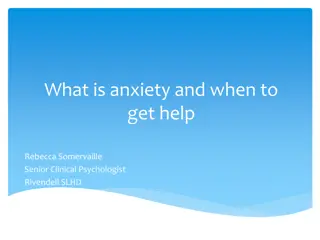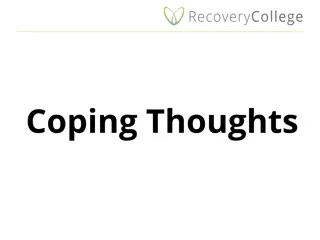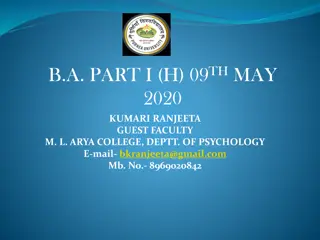Coping With COVID-19 Anxiety: Understanding the Psychological Impact
Anxiety is a common response to the unpredictable threat of COVID-19, exacerbated by the inundation of information from media and social channels. Learn how our minds process anxiety and strategies to manage it effectively.
Download Presentation

Please find below an Image/Link to download the presentation.
The content on the website is provided AS IS for your information and personal use only. It may not be sold, licensed, or shared on other websites without obtaining consent from the author.If you encounter any issues during the download, it is possible that the publisher has removed the file from their server.
You are allowed to download the files provided on this website for personal or commercial use, subject to the condition that they are used lawfully. All files are the property of their respective owners.
The content on the website is provided AS IS for your information and personal use only. It may not be sold, licensed, or shared on other websites without obtaining consent from the author.
E N D
Presentation Transcript
RCSI Centre for Positive Psychology and Health 1 Coping With COVID-19Anxiety ProfessorCiaran O Boyle Director, RCSICentre for Positive Psychology and Health
CopingWithCOVID-19Anxiety ~ ProfessorCiaran O Boyle Director,RCSICentreforPositivePsychology andHealth ~ TheWHO Director-General, Dr Tedros Adhanom Ghebreyesus, addressing theMunichSecurityConferenceonFeb15, 2020, said, We re notjust fightinganepidemic; we re fightinganinfodemic. An editorial in the leading medical journal, the Lancet, on the 22nd of February of thisyear pointed out that the rapid dissemination of trustworthy information(transparent identification of cases, data sharing, unhampered communication, and peer-reviewed research) is what is needed most during this period of uncertainty. 2 However, the author of the editorial went on to state that the ease through which inaccuraciesand conspiraciescan berepeatedand perpetuated via social media and conventional outlets puts public health at a constant disadvantage . Not only does the contamination of media outlets with mis-information put publichealth at a disadvantage, it also creates anxiety and potentially panic. The anxiety associated with COVID-19 travels much faster than the virus itself. As the Lancet editorial puts it: There may be no way to prevent a COVID-19 pandemic in this globalised time, but verified information is the most effective prevention against the diseaseof panic. RCSI Centre for Positive Psychology and Health
CopingWithCOVID-19Anxiety ~ ProfessorCiaran O Boyle Director,RCSICentreforPositivePsychology andHealth ThenatureofCOVID-19anxiety Anxiety is a normal human response to a threat, and it is particularly likely to occur when the threat is unpredictable and uncertain. In Ireland, this week s unprecedented closures and restrictions, while necessary, are likely to further increase anxiety. Emotions such as anxiety are important as they orient us towards a threat and help us decide what to do next. However, the features of the COVID-19 outbreak and the non-stop media cycle with the accompanying saturation of social media channels have resulted in levels of anxiety that, for many, are not correctly calibrated to the threat. Our emotions can bias us in terms of the information we respond to and the decisions we make - our emotions can lead us astray. For example, with COVID19, we have already seen, in some countries, the rise in suspicions of certain ethnic groups and this has resulted in xenophobic behaviour. There are a number of features of the way that our minds work that can serve to increase our anxiety in the current situation. One of these is called the availability bias where we give more weight to events that we can immediately experience and recall. The non-stop media cycle perpetuates this bias as it exposes us continuously to anxiety provoking events associated with the spread of the virus. The availability bias is not the only factor influencing anxiety in the current circumstances. We tend to believe things that we hear repeatedly, whether or not they are true, and we also remember things that elicit strong emotions. In addition, the emotions we experience significantly influence the information that we attend to. For example, research has shown that if we are anxious we pay much more attention to anxiety provoking events and and we also overestimate their likely future occurrence. 3 So, it is clear that the characteristics of the present outbreak (especially uncertainty and unpredictability), the non-stop media cycle, the saturation of social media, and the particular ways in which our minds work can create a hyper-vigilant state in which our anxiety drives us to seek out more and more information. This, in turn, increases our anxiety in a self-perpetuating cycle that can prove disabling. RCSI Centre for Positive Psychology and Health
CopingWithCOVID-19Anxiety ~ ProfessorCiaran O Boyle Director,RCSICentreforPositivePsychology andHealth Thefollowingaremethodsthatyoucanusetocounteractthedevelopmentof inappropriatelevelsofanxiety: 1.Information, but not too muchofit. It is important to stay informed as the situation develops. However, checking your phone every five minutes to see what the rates are or whether there is some other new development can only serve to increase your anxiety. Take breaks from watching, reading, or listening to news stories. Try to do some other activity you enjoy and keep life as normal as possible. It is also better to educate yourself from a small number of solid news outlets and reliable sources than to be overwhelmed by information, much of it dubious, from social media. Reliable websites include those ofthe Irish Department ofHealth (Department ofHealth - Coronavirus COVID-19), the HSE (https://www.hse.ie/eng/services/news/newsfeatures/covid19-updates/ ), the World Health Organisation (WHO - Coronavirus DiseaseCOVID-19outbreak), the European Centre for Disease Prevention and Control (ECDC - Coronavirus ( COVID-19)) and the US Centres for Disease Control and Prevention (CDC: https://www.cdc.gov/coronavirus/2019-ncov/index.html). 4 2.Gain asenseof control In addition to being important in preventing the spread of the virus, washing your hands, coughing the right way, decreasing person to person contact and even actively socially isolating yourself can provide a sense of control that helps reduce anxiety. 3.Connect with loved ones Relationships are important in reducing stressand increasinghappiness. Asthe outbreak proceeds, increasing social isolationis likelyto become the norm. However, we can use technology to maintain links with our friends and loved ones. This can be particularly important if we are feeling overwhelmed; connecting or reconnecting with someone who is not overwhelmed by fear and anxiety can help to put things in perspective.For many of us, our main concern is for elderlyparents and other relatives. One useful approach here is to print out information and guidelines from reputable websites such as the HSE and the Department of Health and make it availableto them in paper form. 4.Lookafter your generalhealth Take care of your general health. Breathe deeply, especially when anxious, stretch and meditate. Try to eat healthy, well-balanced meals, exercise regularly, get plenty of sleepand moderate alcohol intake. RCSI Centre for Positive Psychology and Health
CopingWithCOVID-19Anxiety ~ ProfessorCiaran O Boyle Director,RCSICentreforPositivePsychology andHealth 5.Manageanxietythrough meditation,breathingandnaming Make timetounwind and remindyourselfthatstrongfeelingswill fade. Deep slow breathingactivatesbodysystemsinvolvedin restand digestionand bygivingour bodiesthemessagethatitissafeleads toafeeling of calm.Namingyouranxiety (e.g. I m feeling reallyscaredright now,I canfeelmyheartracing and I feelalittle dizzy) createsspacebetweentheemotional feeling and thethinking partof your brain.In this space, youcangetsomedistanceand observetheemotion ratherthan lettingitflood youcompletely.Thissupportsyourability tothink abouthowto respondand howtoshift out of theunpleasantheightenedemotional experience. Learning and practisingmeditation isahighlyeffectivewayof managinganxiety. 6.Consider thecommon good Wein Ireland havealongtradition of thecommunitygatheringtosupportthe individual. In traditional farmingcommunities,for example, thistooktheform of a Meitheal whereneighbours gatheredtogetherto support one another. A good modern exampleis#selfisolationhelpwhich istrendingon Twitter.The hashtag allowspeopletovolunteertoassistothers (e.g. buyinggroceries,walking thedog etc)whoareself-isolating orin needofhelp becauseof COVID19. It islikelythatour individuallibertieswill havetobecurbedthrough quarantinerestrictionsand similar strategiesdesignedtoreducethespreadof thevirus. Weknow,from researchin positivepsychology, thatparticipating in meaningfulactivities, especiallythosethat supportthecommongoodisamajorcontributortoour senseof well-beingand happiness. 5 7.Talktoyour children Whenchildrenarefacedwithstressfulsituations,theyreact, in part, basedon the reactionsof adultstheyseearound them.Whenparentsand caregiversdealwith theCOVID-19 outbreak calmly and confidently, theyprovidethebestsupport for their children. Parentscan bemorereassuringto othersaround them,especially children, if theyarebetterprepared.Thefollowingarehelpfulstrategies: 1. It isimportant totaketimetotalk toyourchildabout theoutbreak, answerany questionstheymayhaveandsharefactsabout the virus in a way that your childcanunderstand. 2. Childrenmodel theirbehaviouron adultsespeciallyin timesof stress.Youcan beagoodrolemodel bylooking afteryourownphysicaland psychological health. 3. Childrenneedreassurancethattheyaresafe.Thisapplieseventoolder childrenand teens.Let themknowthatyouunderstandtheirworries,thatitis oktobeupsetand thatyourprimaryfocus ison theirsafety. RCSI Centre for Positive Psychology and Health
CopingWithCOVID-19Anxiety ~ ProfessorCiaran O Boyle Director,RCSICentreforPositivePsychology andHealth 4. Sharing how you deal with your own anxietycan be helpfulin teaching children how to cope. 5. Just as it is important that we adults manage our exposure to media coverage of the outbreak, it is also important to manage our children s exposure. Children may misinterpret what they hear and can be frightened about something they do not understand. 6. Help your child to maintain a senseofstructure. This will be particularly important ifour schools are closedfor a period of time. 7. Bemindful ofhow you talk to other adults when children are present. Assume little ears are always listening, especially when a conversation has heightened emotion. 8. Ask children and teens if they have any questions try to create a dialogue rather than a monologue. Children respond wellto such prompts and it can give you the chance to assesstheir understanding and surfaceany particular anxietiesthey may have. The US National Child Traumatic Stress Network provides useful information on how best to understand and respond to children s needs at this time. https://www.nctsn.org/sites/default/files/resources/fact-sheet/outbreak_factsheet_1.pdf 6 8.Maintain asenseof hope The race is on to develop effective vaccines and new treatment approaches will emergeas knowledge about the virus and itseffectsincreases.Whereas, significant numbers ofus are likelyto be infected, the impact on most of us will be modest. When we lookback on previous acute outbreaks such as the SARS, MERS and AIDS epidemics we can seethat, likethose, this too shall pass. 13/3/2020 RCSI Centre for Positive Psychology and Health
